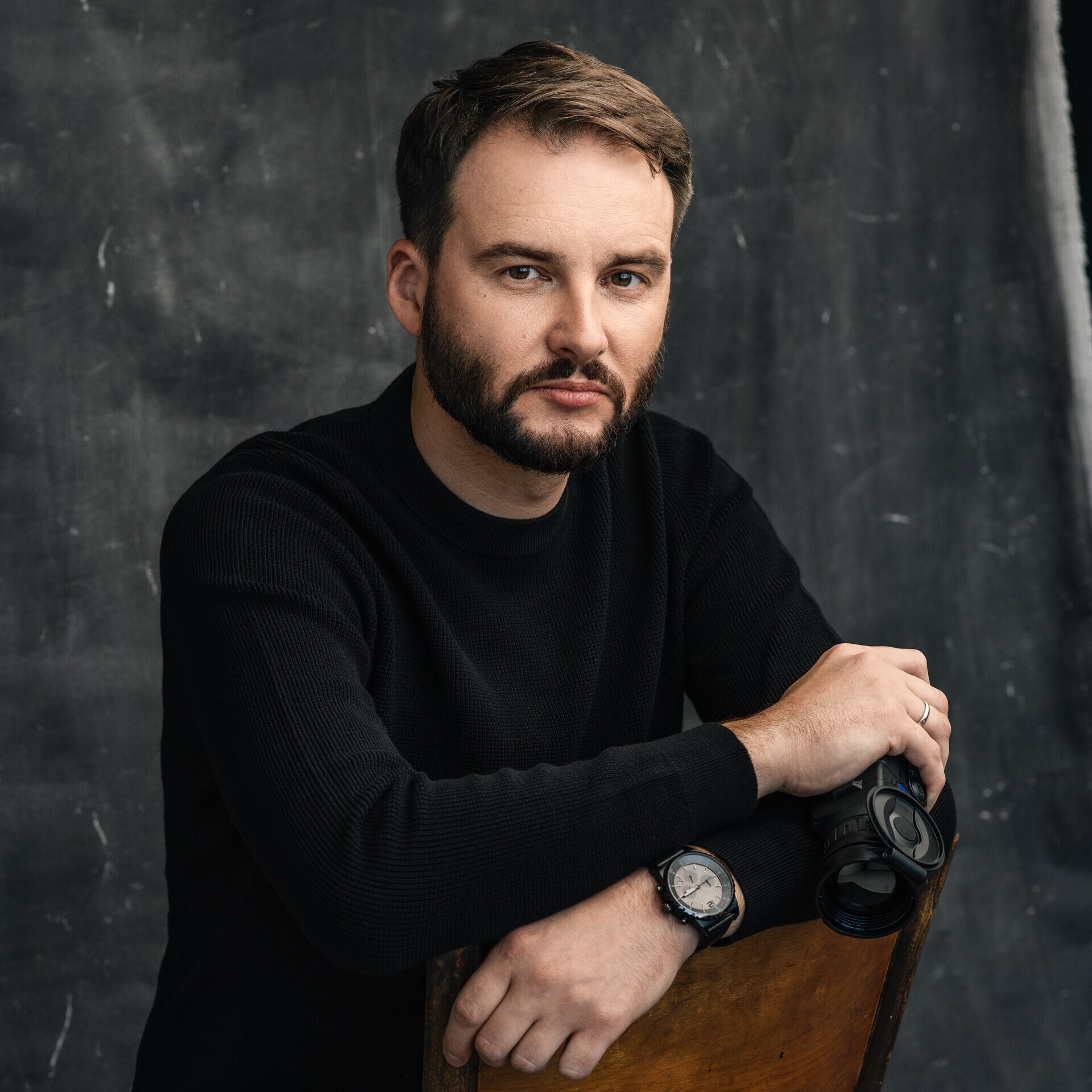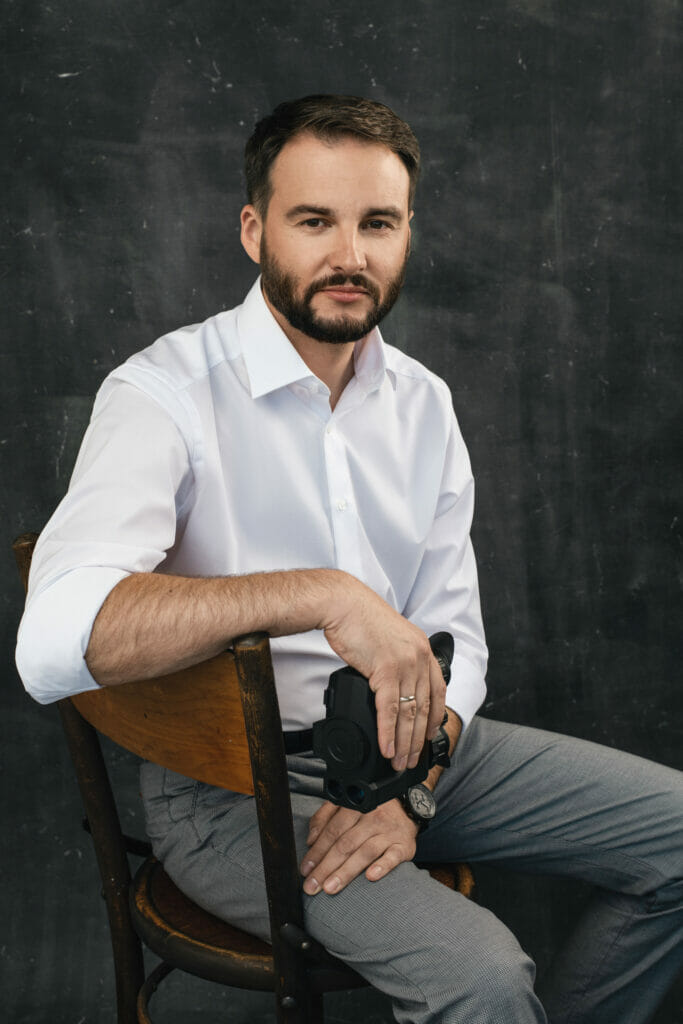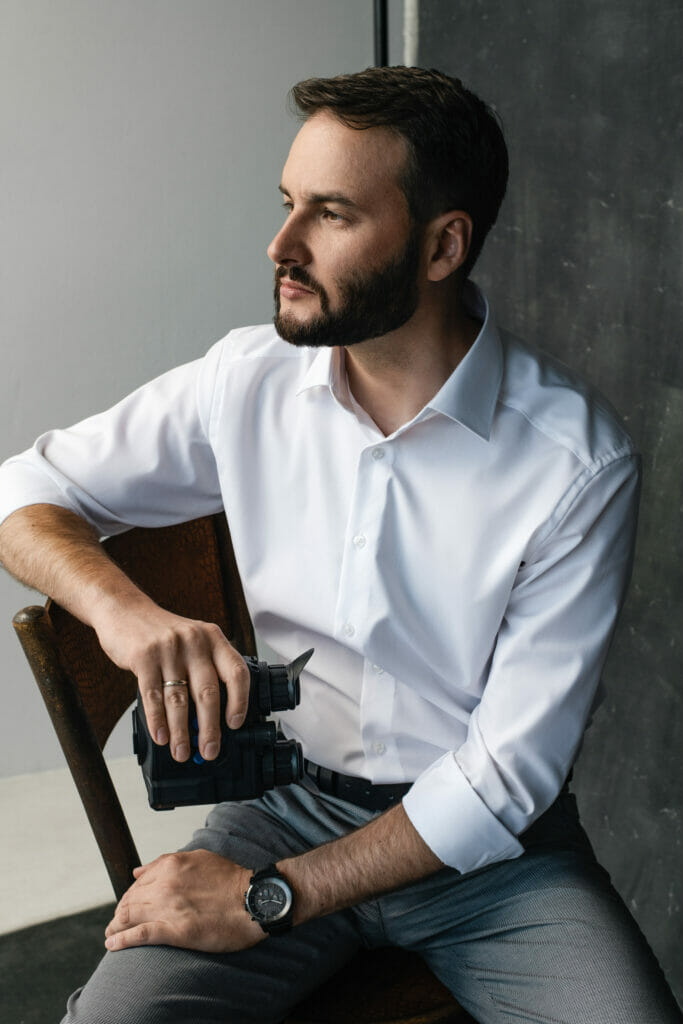
Linas Guobys
Sometimes hunting is not about the catch at all. It is rather a getaway to the forest – both physical and mental. Linas Guobys was drawn to hunting by his father, a hunter himself. The two used to spend hours in the forest together, lost in their thoughts, observing the surroundings, and waiting patiently. To them coming home empty-handed was never a defeat. On the contrary, to Linas, who is head of production at Yukon Advanced Optics Worldwide / PULSAR, hunting is far more than that. To him, it is observation of the interconnected world we live in and the inner self.
How did you discover a love for hunting?
I come from a family of hunters. My father used to hunt. It was him who got me into hunting. I was 14 or 15 when my father took me on a hunting trip for the first time. I was fascinated by the experience. So, when I was 18, I got my first weapon and started hunting on my own.
To me, hunting is about the simple things, time with yourself, a time to leave worries behind. And it’s definitely not for everyone.
Linas Guobys
What did you find so special about hunting that caught your interest?
To me, it is either a gathering of like-minded people or a solo adventure. I enjoy individual hunting in summer, but I also like it when a bunch of guys gather in the forest in wintertime for a hunt. It is a great joy to observe wild animals in their natural habitat – something you can’t do in a city. A fox crossing the track, a roe deer timidly looking around, an elk walking out of the forest. It fills you with a lot of unforgettable experiences. And then, of course, come the first shots with adrenaline flooding every inch of your veins…
Do you remember your first hunt?
No, I wouldn’t say any special memories come to my mind. It’s more about the adrenaline, the trembling hands, the increasing heart rate. Adrenaline is addictive. This is why we all fall for all different kinds of hobbies. It’s all about the feeling that fills you within.
Is it true that sometimes you go hunting with no intention of hunting per se?
I think it comes with age. If you ask an 18-year-old, they’ll tell you that hunting is solely about the catch. Tracking the animal and firing a shot. To me, hunting is a complex ritual, a kind of meditation. You drive out of the city, find a quiet place in the forest, sit back and wait. I don’t really care about firing a shot. Sometimes, I don’t even care if I see an animal at all. I just need this time for myself, to be alone in nature, contemplating and refreshing my mind. The forest is the only place where I don’t think about anything. I just sit there with my mind stilled with only my eyes blinking and gazing forwards.
I never experience this calming peace of mind at home. Whatever I do there, thoughts of work and other worries circle around in my head.
What do you take with you on a hunting trip?
The less stuff, the better. I’ve seen a TV show where a young hunter showed his backpack full of strange gear, as if he was off on a survival trip. In truth, only a few things really matter: comfortable clothing, an extra pair of socks in case they get wet, insect repellant and water to keep you hydrated. And of course, your hunting gear – a weapon, ammunition, and a night vision device or thermal imager for a greater hunting experience. I like to have my Pulsar thermal imaging binoculars with me so I can look around when it’s getting dark or foggy in the forest. It’s such a pleasure! My father used to have a night vision imager; I remember how I enjoyed observing the surroundings through its lens as a kid. I always had this somehow magical vision of a roe deer coming out of the forest at night. Before my father’s thermal device proved to me that the deer would rest in a meadow all day long – something you wouldn’t notice with the naked eye.
Not only are you a hunter but you also lead a team of innovative hunting optics developers. Do you have any favorite devices?
The Accolade 2 LRF Pro thermal imaging binoculars by Pulsar is definitely my favorite toy. It has a built-in laser rangefinder which is great for measuring distances with great accuracy. I also have tried a Helion 2 XQ monocle which is distinctive for its highly sensitive thermal imaging sensor which ensures perfect detail recognition even in the darkest weather conditions. But I have to admit I love the Pulsar binoculars more. I find it more comfortable to look through the lenses with both eyes.
What is your favorite time of the day in the forest?
When it’s getting dark around sunset. In summer, I really enjoy being in the forest late at night when the nature calms down. You can still hear the birds singing but no other sounds interfere with the silence. True silence! To me, it’s just perfect. It calms me down. I’m a sleepy type of person and I don’t like to go hunting early in the morning. I really need proper sleep to feel fresh. And obviously, I hate it when the songs of birds mix with the roaring of tractors…
How often do you go hunting?
I wouldn’t say hunting is my lifestyle. It’s a hobby. I go hunting once every two weeks, sometimes more often. It depends. I wasn’t hunting that much this summer as it has been a really and even the animals kept hiding deep down in the forest from the heat.
To me, hunting is about the simple things, time with yourself, a time to leave worries behind. And it’s definitely not for everyone.
Linas Guobys
I actually have the best thoughts and ideas come to my head while I’m hunting. When I’m out there, away from the daily routine, my mind is clear and starts filling up with amazing ideas.
How would you describe your hunting philosophy?
To me, it’s a way to calm inner storms. It’s the absence of thoughts and problems. I never scroll through my mobile phone while I’m in the forest. It’s a strict rule. I consciously want to break away from my daily life, to clear my head.
You seem to enjoy hunting alone much more than with others?
It depends on the season and on my mood. I usually go hunting alone on weekends. After a long week at work and the many conversations I already had, I just want to be alone, in silence. I actually have the best thoughts and ideas come to my head while I’m hunting. When I’m out there, away from the daily routine, my mind is clear and starts filling up with amazing ideas. I’m convinced one can never come up with any brilliant new ideas at the workplace. Because there you have to concentrate on routine stuff, on solving daily problems. To be really productive, and most importantly creative, there’s no other way than simply getting away from your workplace.
I’m wondering how you approach hunting sceptics?
I don’t talk to them anymore. I’m tired of explaining myself to them and telling them things that no one really wants to hear. I know it’s always going to end as a one-way conversation. Why even try?
But if no one bothers to explain the motivation behind hunting, we end up at a dead end, don’t we?
That is exactly where we are! And I don’t really see a way to move forward. At home, everybody knows my motives. My family understands why I’m doing this. Unfortunately, not all of my friends agree with it. I used to try to explain my philosophy but then I just gave up. The conversation will go something like:
“Hunting is expensive, go buy yourself all the meat you want in a supermarket!”
“But I don’t go hunting for meat.”
“So why do you go at all?”
“I go to rest in the forest.”
“Why don’t you rest on a couch?”
This is exactly where the conversation reaches a dead end. That’s why I don’t care about explaining anymore.
The portrait of a hunter in my homeland Lithuania is distorted. To many it’s an angry drunk man in a camouflage jacket. The one firing shots at anything moving in front of him with no regrets. That’s how hunting is portrayed. It isn’t related with ancient traditions dating back to the 18th–19th century that were cruelly blown away by the Soviets. I look back at the French and German traditions with jealousy because we could’ve been there too, with more understanding and advocacy instead of anger and groundless criticism.
We rarely talk about the fact that hunters take care of the animals, such as by feeding them during the harsh weather conditions in winter.
We probably rarely talk about this because of how it is interpreted in public: the hunters feed the animals to tame them to later kill them in cruelty. When in fact, it has nothing to do with the reality.
I don’t really think the wild animals need to be taken care of at all. During summer, they can look after themselves anyway because there’s plenty of food around. It gets a bit more complicated in winter, especially when the forest is covered in deep snow, yet still, the animals know how to dig through snow for food. If we intervene, over time the animals lose their natural survival instincts, a roe deer may end up getting severely sick or even dying while sleeping on the cold snow instead of digging a cozy hollow. Animals are far cleverer than we think they are. Did you know the wild boar is perfectly capable of weaving a nest from bulrush? Moreover, if they get wounded, they look for wild plants and roots that would stop the infection from spreading and would heal the wound. So, wildlife doesn’t need our help to survive. On the contrary, if we deprive animals of their natural abilities, a degradation process will start. Therefore, I think we should trust nature and let it handle business on its own.
The Accolade 2 LRF Pro thermal imaging binoculars by Pulsar is definitely my favorite toy. It has a built-in laser rangefinder which is great for measuring distances with great accuracy.
Linas Guobys

Then what is the role of a hunter in this ecosystem?
We humans were never separated from nature. Yet our role in the ecosystem isn’t always performed by clever means. Unfortunately, some of the consequences of our actions need to be fixed. For example, when people started feeding animals with certain medicine to prevent the spread of rabies, it caused a significant increase in wild animal populations. Just like when the wolves came close to extinction in my native Lithuania, a significant increase of the population of ungulates was the natural consequence. It led to the weakening of certain species. That’s where the role of a hunter becomes vital – to divide the weak ones and the strong.
How do you separate the strong from the weak with the naked eye?
You just follow the signs and add a bit of knowledge. Let’s take a deer as an example. Only a strong and healthy animal will grow properly structured horns. Small, irregular-shaped antlers indicates weakness in the animal’s organism. A deer with deformed horns can easily hurt its strong rival during a fight. In the end, the strong animal will die, while the weak one survives to continue the weak line through its offspring.
I enjoy observing the same animals for months and even years sometimes. Seeing a weak deer makes me realize there will be another weak animal walking next to him the next year. And that’s exactly what happens…
How do you manage to keep track of particular animals and follow their story year after year? How do you even know it’s the same one?
Ungulates lead a pretty settled lifestyle. Elks migrate, while deer usually live in quite a narrow territory, so it’s not that hard to find them the next time you visit the forest in the same place you saw them resting last time.
Which animals do you enjoy observing most? I would guess the biggest ones?
Not really. Sometimes I notice a fox jumping around the snow-covered valley and it’s such fun to watch it sneaking around after a tiny mouse! Ears pressed against its head, the fox keeps lurking then suddenly dives deep down into the snow and comes back with a tasty catch. To me, that’s far more captivating than the static view of an elk walking out of the forest.
I wonder, if you come back from the forest with a catch, do you cook something delicious that same evening or do you keep the meat for the future?
I don’t usually cook on the same day. Most often, I simply freeze the meat or give it away to friends and relatives. On the other hand, I really enjoy cooking for my family and trying out new recipes. I’ve been cooking various meat dishes since my childhood.
Still, as I mentioned, the catch was never the main reason why I go hunting. I’ll never be the one trying to convince others whether it’s good or bad to be a hunter, and I definitely don’t decorate my home in fur and horns… I simply don’t see any charm in this.
It seems that simply being there, in the middle of the forest, is quite enough for you, is it?
Exactly. To me, hunting is about something else. Some go hunting to meet with friends, to socialize, to build new relationships. Some start the hunting journey by purchasing the most expensive gear and ammunition. Does really having an expensive rifle mean you’re a better hunter? I honestly doubt it. I was invited to a so-called privileged hunters’ club once. In an instant I felt like I didn’t belong there, and I left.
To me, hunting is about the simple things, time with yourself, a time to leave worries behind. And it’s definitely not for everyone. Once I took a friend on a hunt. I remember us sitting there quietly waiting for hours. When his patience was finally spent, he whispered: “So… when will the animal come out of the forest?” That night there were no animals in our sights, so I said: “It’s time to go home.” “Is it over yet?!” I must admit my friend was quite surprised. I think he was expecting something similar to an action movie scene with a bunch of animals running around and shots thundering. Obviously, that was his first and his last time hunting.
Then, there was another friend eager to take part in a driven hunt. After a few hours of drive, he got very tired and decided it wasn’t for him. I’m pretty sure he had this image in his head of men riding horses and playing trumpets, just like in old French or British pictures. In reality, you need to be prepared, have patience and, most importantly, truly enjoy the process.
How about your kids, are they interested in your hobby?
My son is five now, a bit too young to go hunting with me. But my daughter, she’s 13, already keeps asking me to take her someday. We live in a quiet place surrounded by lakes and woodland, and we all enjoy spending time in nature. Sometimes I take my thermal imager with me, we drive to the forest to observe the roe deer or foxes. Both for kids and me it’s great fun. Obviously, I wouldn’t bring a gun when I’m with kids. I don’t think their first experiences should be about the death of an animal. Because death is a sensitive act, and it never happens in an instant. But spending time in nature is of great importance to all of us. I hope they won’t lose this joy when they grow up. I’m not sure if any of my kids will fall for hunting someday. But if they ask me to, I will certainly introduce them to my philosophy of hunting. Just like my father once did. When I look back at those times, I think we both saw hunting as a retreat to a peaceful inner forest.
Do you have a story to share? Drop us a message: journal@pulsar-vision.com.
Linas Guobys
We live in a quiet place surrounded by lakes and woodland, and we all enjoy spending time in nature. Sometimes I take my thermal imager with me, we drive to the forest to observe the roe deer or foxes. Both for kids and me it’s great fun.
Before purchasing any night or thermal vision device, please make sure you adhere to the local legislation and only use it when it is allowed. Our ambassadors come from various countries and travel a lot, which allows them to test different devices. We do not encourage or support the illegal use of our devices in any events. If you wish to learn more about export and sales restriction policy, please visit the following link: Export and Sales Restriction Policy.

